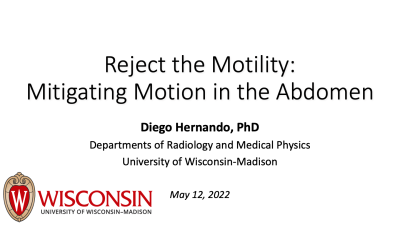Sunrise Course
Hot Topics in Body MRI: Motility in the Abdomen: Love It or Hate It?
Joint Annual Meeting ISMRM-ESMRMB & ISMRT 31st Annual Meeting • 07-12 May 2022 • London, UK

| 08:00 | Embrace the Motility: Visualizing Motion in the Abdomen
Catharina de Jonge
Assessment of the (patho)physiology of the gastrointestinal (GI) tract is important for diagnosis and treatment monitoring of gastrointestinal diseases. Due to its location in the body, it's length and physiology, the GI tract is a complicated organ to investigate. Standard measurement methods, like manometry, are invasive and cannot assess the entire GI tract. Therefore MR motility methods are on the rise. This educational talk will review the existing and emerging techniques to capture and quantify motility with cine-MRI and explore the clinical implementation.
|
||
| 08:30 |  |
Reject the Motility: Mitigating Motion in the Abdomen
Diego Hernando
Body MRI is complicated by the presence of multiple sources of physiological motion, including respiratory, cardiovascular, peristaltic, and bulk patient motion. If unaddressed, these sources of motion can lead to multiple artifacts, particularly ghosting and blurring. Motion artifacts can also lead to bias and poor precision in quantitative MR methods. This educational talk will review the major challenges of motion in body MRI, as well as existing and emerging solutions. Importantly, this talk will attempt to outline the benefits and drawbacks of each motion mitigation method.
|
The International Society for Magnetic Resonance in Medicine is accredited by the Accreditation Council for Continuing Medical Education to provide continuing medical education for physicians.